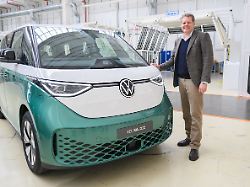Vision for 15 to 20 years
VW is planning an electric van family
December 2, 2023, 11:42 a.m
Listen to article
This audio version was artificially generated. More info | Send feedback
When the project name “Space” comes to mind, some people might think of outer space. Volkswagen is planning to convert its entire Transporter fleet to electric mobility under the name. The ID Buzz will then continue to be expanded.
According to the electric Bulli ID buzz, Volkswagen wants to convert its entire van fleet to electric from 2028. The large Crafter transporter will start in 2028, VW Commercial Vehicles boss Carsten Intra announced in an interview with the German Press Agency. The other models would then come one by one: “We are planning a timed model change, not all at once, but neatly staggered in a sensible rhythm.” In the end, a complete family of electric vehicles should be created under the project name “Space”.
Until now, the VW van division based in Hanover had primarily relied on the ID Buzz, which was launched in 2022, for e-mobility, of which there will also be a long version and a sporty variant next year. The fact that the entire fleet is now being electrified is the result of a large order from Audi that fell through: the Ingolstadt sister company actually wanted to have a new top electric model built in Hanover from 2026.
But in September Audi withdrew the order. As a replacement, VW Commercial Vehicles was awarded the contract for its own electric platform by the group. This creates the possibility of electrifying the entire fleet. For the first time, an entire vehicle family can be developed on the new platform. “That simply wouldn’t have been possible with the platform on which ID Buzz is based.” Because the E-Bulli still shares technology with the ID.4 electric SUV from the car division. The E-Crafter, which will be offered in small numbers until 2022, was just a combustion engine converted to electric.
Radical course change
Intra is convinced that the new platform will ultimately be significantly better than the lost Audi order. “We are now strengthening our own commercial vehicle expertise with our own platform. We have never had that before.” This is a radical change of course for VW Commercial Vehicles. “We have completely changed our strategy,” said Intra. “From a lot of external production for other brands to our own products.” This means you now hold all the strings in your own hands.
“What we have now is actually a vision for the next 15 to 20 years.” In the end, this will more than compensate for the loss of the Audi order. Unlike the passenger car division, which suffers from production downtimes and high costs, business at VW Commercial Vehicles is currently going well, according to Intra. “2023 will be a very strong year, I’m sure,” he said. “We actually think it could be a record year in terms of earnings.” After the delivery bottlenecks of the past few years, production is now running again and the high order backlog is being processed.
The current orders will remain at capacity until mid-2024. Things won’t continue like this after that. “The next two or three years will certainly be more difficult,” said the brand boss, referring to the economy. “We’ll have to stretch a bit.” The ten billion euro savings package currently being negotiated with the works council in Wolfsburg does not affect the commercial vehicle division, emphasized Intra. They are not involved in the negotiations; the targeted sum only relates to the passenger car division.
“We already have our own strategy program, which we call Grip.” This has been going on since 2021 with good results: “We are making even faster progress than originally planned.” He therefore sees no reason to do this again, said Intra. When it comes to personnel, the aim is to reduce the number of employees from 15,000 to just over 10,000 by 2029 – without laying off people by not filling vacant positions. “And we will then be able to keep this team busy.”
Intra left it open when VW Commercial Vehicles would completely phase out the combustion engine. “It will ultimately be up to the customers to decide.” By 2030, the aim is to have a share of more than 55 percent electric. “In the end, the market will decide when it will be 100 percent.” With the new electric platform, which is now being developed for the “Space” family, you can react flexibly at any time. Intra also left it open as to when the ID California electric camper based on the ID Buzz, announced in 2021, would be launched. “The concept is basically ready. But we have to wait until there is really widespread demand for such a vehicle. We don’t see that happening yet.” He therefore does not expect the electric motorhome to be launched until the second half of the decade. “Certainly not before 2025. And not after 2030 either.”
